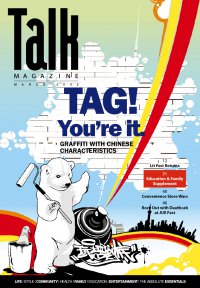Ouyang Yu: Chinese-Australian Australian-Chinese Poet
Like many Chinese of the past two generations, translator, novelist and poet, Ouyang Yu finds himself caught in a world that happens in both English and Chinese. His work is a reflection of as much. Writing prolifically in both tongues, his work deals with the topics of identity and language in a world where China and the West move closer together with increasing tension.
Ouyang Yu describes his initial entry into the world of the English language as more of a coincidence than anything else. Like many of his generation during the Cultural Revolution, Ouyang was required to delay his studies and work in the countryside. “When I finally went to uni, it was hard for many people my age to find a place. We had to gravitate to the humanities to get in – Chinese literature and English mostly.”
 And while his interest in English might have been a coincidence, his interest in poetry was not. “I wrote poetry in the countryside [during the Cultural Revolution]. It was always something that came naturally to me,” Ouyang recalls.
And while his interest in English might have been a coincidence, his interest in poetry was not. “I wrote poetry in the countryside [during the Cultural Revolution]. It was always something that came naturally to me,” Ouyang recalls.
After completing his doctorate at Australia’s La Trobe University in 1995, Ouyang, unable to find a position teaching in Australia, found himself pursuing a career as a poet and novelist. In his first works of English poetry, Moon Over Melbourne (1995) and Songs of the Last Chinese Poet (1997), he describes his sense of disillusionment while trying to find a place for himself in Australian society. ‘The Professor has just gone back to China’ in Songs of the Last Chinese Poet reads:
the professor has just gone back to china
leaving behind him these words:
it is an open enough place
but the house of every heart
is locked from inside
and there has never been a key
Later, in ‘An Identity CV’ in New and Selected Poems (2004), he describes himself as “a stateless and statusless poet” and “getting caught by two, wanted by none, hated by most, and preferring to be left alone”. These barbed jabs at Australian society and his place in it earned him the epithet of ‘the angry Chinese poet’. However, Ouyang feels that both he and his poetry have changed. “These poems remind me of the days that I spent about 10 years ago. I’ve been in Australia for the last 20 years. There’s been a change over time. As I stand in today’s Australia, I’m not very concerned with that anymore.”
 Today, Ouyang finds himself gravitating towards other issues. In his most recent collection of poetry, The Kingsbury Tales (2008), he finds himself taking on broader topics such as Chinese and its evolving relationship with the English language. In ‘The English Empire’ he criticises the way that English has become an obsession of China’s intelligentsia saying, “In the past they colonised you, now you colonise yourself.” In commenting on this poem, he says, “It makes me feel uncomfortable that Chinese people will regard another language as more important than their own.”
Today, Ouyang finds himself gravitating towards other issues. In his most recent collection of poetry, The Kingsbury Tales (2008), he finds himself taking on broader topics such as Chinese and its evolving relationship with the English language. In ‘The English Empire’ he criticises the way that English has become an obsession of China’s intelligentsia saying, “In the past they colonised you, now you colonise yourself.” In commenting on this poem, he says, “It makes me feel uncomfortable that Chinese people will regard another language as more important than their own.”
With regard to his own feelings about Chinese and English, Ouyang describes himself as “ambivalent”, calling Chinese his “mother tongue” and English his “father tongue”. Still given his privileged position as a master of both, he says he’s aware of a tension between them, a tension his future works will undoubtedly explore.
Ouyang Yu will be giving a talk entitled ‘Speaking English, Thinking Chinese and Living Australian’ at 1pm on Saturday, 10 March at the Shanghai International Literary Festival. Web: www.ouyang.com.au
WIN!
For your chance to win two tickets to see Ouyang Yu, send an email to [email protected] telling us why you'd like to see him!

